
AJIDD-American Journal on Intellectual and Developmental Disabilities
Scope & Guideline
Innovating Care, Inspiring Change.
Introduction
Aims and Scopes
- Research on Developmental Outcomes:
The journal focuses on studies that examine developmental trajectories and outcomes for individuals with intellectual and developmental disabilities, including the impact of various interventions on cognitive, social, and communicative skills. - Family and Caregiver Perspectives:
AJIDD emphasizes the importance of family dynamics and caregiver experiences, exploring how these factors influence the well-being and quality of life of individuals with IDD. - Healthcare and Policy Implications:
Research addressing healthcare access, policy implications, and systemic barriers faced by individuals with IDD is a core area of focus, aiming to inform better practices and improve service delivery. - Equity and Inclusion in Research:
The journal promotes equity-focused research in IDD, advocating for diverse representation and the need to address systemic inequities within the research community. - Interventions and Support Strategies:
AJIDD publishes studies on various intervention strategies, including behavioral, educational, and therapeutic approaches tailored for individuals with IDD, highlighting best practices and innovative methods.
Trending and Emerging
- Impact of COVID-19 on Individuals with IDD:
There is a notable increase in research exploring the effects of the COVID-19 pandemic on individuals with IDD, including their health, access to services, and overall quality of life, reflecting the ongoing relevance of this global event. - Focus on Mental Health and Well-Being:
Emerging studies increasingly address mental health issues and well-being among individuals with IDD, emphasizing the need for integrated care approaches that consider psychological health alongside developmental support. - Person-Centered and Family-Centric Research:
Research that prioritizes the perspectives and experiences of individuals with IDD and their families is on the rise, advocating for more inclusive practices that recognize the importance of personal narratives and family dynamics. - Equity and Diversity in IDD Research:
There is a growing emphasis on equity, diversity, and inclusion in IDD research, with more studies focusing on underrepresented populations and the social determinants of health that affect these communities. - Technological Interventions and Innovations:
The use of technology in interventions, such as telehealth and remote support systems, is increasingly highlighted, showcasing innovative approaches to service delivery and support for individuals with IDD.
Declining or Waning
- Traditional Diagnostic Approaches:
There seems to be a declining focus on conventional diagnostic criteria and classifications for intellectual disabilities, as newer research increasingly emphasizes a more holistic, person-centered approach. - Single-Condition Studies:
Research focusing solely on specific conditions (e.g., Down syndrome or autism) is waning, with a growing trend towards comparative studies that examine multiple conditions and their intersections. - Stigmatization and Negative Outcomes:
While still relevant, studies solely focusing on the negative aspects of living with IDD, such as stigmatization and maladaptive behaviors, are less frequently published, as the field shifts towards resilience and positive outcomes.
Similar Journals

Learning Disabilities-A Multidisciplinary Journal
Fostering dialogue to enhance lives and learning.Learning Disabilities-A Multidisciplinary Journal is a leading academic journal published by SAGAMORE PUBLISHING LLC, dedicated to advancing the understanding of learning disabilities through a multidisciplinary approach. With a focus on research that incorporates psychological, educational, and social perspectives, this journal serves as a vital resource for researchers, educators, clinicians, and practitioners committed to improving the lives of individuals with learning disabilities. The journal aims to foster scholarly dialogue and disseminate innovative findings, thereby enhancing existing knowledge and informing best practices. Although it currently does not offer open access options, it provides robust insights and rigorous research, ideally positioned to influence the field. By adhering to high academic standards and expanding its reach, Learning Disabilities contributes significantly to evidence-based practices and interventions, making it an essential platform for academic and professional discourse in the study of learning disabilities.
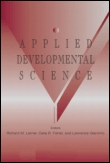
Applied Developmental Science
Transforming research into practice in developmental psychology.Applied Developmental Science is a leading academic journal dedicated to enhancing the understanding of human development across the lifespan. Published by Routledge Journals, Taylor & Francis Ltd, this esteemed journal stands out in its field with a remarkable impact factor and prestigious Q1 classification in Applied Psychology, Developmental and Educational Psychology, and Life-span and Life-course Studies, as of 2023. By focusing on empirical research and innovative theoretical perspectives, Applied Developmental Science serves as a vital resource for researchers, professionals, and students alike, fostering a deep understanding of developmental processes. The journal’s high rankings highlight its influence and commitment to advancing knowledge in developmental psychology. Although not an open-access publication, it provides invaluable insights for those engaged in developmental science, making it a cornerstone for academic inquiry and professional practice within the discipline.

Preventing School Failure
Cultivating a Brighter Future for Every StudentPreventing School Failure is a distinguished journal published by ROUTLEDGE JOURNALS, TAYLOR & FRANCIS LTD, dedicated to the critical field of education and developmental psychology. With an ISSN of 1045-988X and an E-ISSN of 1940-4387, this journal rigorously explores strategies to enhance educational outcomes and address the multifaceted challenges faced by students and educators alike. Offering a platform for innovative research, it ranks in the Q3 category for Developmental and Educational Psychology and Q2 in Education, reflecting its significance in these fields. The journal's Scopus rankings further underscore its impact, with notable positions in both Social Sciences and Psychology. Preventing School Failure is a non-open access journal, ensuring that its research reaches an audience committed to advancing educational practices. Based in the United Kingdom, the journal serves as a cornerstone for researchers, professionals, and students who seek to contribute to and benefit from the latest in educational research and intervention strategies.
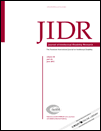
JOURNAL OF INTELLECTUAL DISABILITY RESEARCH
Transforming perspectives on intellectual disabilities through scholarship.JOURNAL OF INTELLECTUAL DISABILITY RESEARCH is a premier scholarly publication that serves as a vital platform for interdisciplinary research in the fields of intellectual disabilities, rehabilitation, neurology, and mental health. Published by Wiley, the journal boasts an impressive reputation, evidenced by its latest Scopus rankings, which place it in the Q1 category in Arts and Humanities (miscellaneous) and Rehabilitation, while also achieving Q2 status in Neurology and Psychiatry. With an enduring history from 1957 to the present, this journal provides open access to groundbreaking studies and insights that drive forward our understanding of intellectual disabilities and their related challenges. The journal’s commitment to publishing high-quality research makes it an indispensable resource for academic researchers, healthcare professionals, and students seeking to contribute to or learn from the contemporary discourse on disability research. Engage with us as we explore the complexities of intellectual disabilities through rigorous, impactful scholarship.
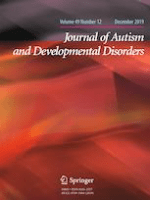
JOURNAL OF AUTISM AND DEVELOPMENTAL DISORDERS
Advancing understanding of autism and developmental disorders.JOURNAL OF AUTISM AND DEVELOPMENTAL DISORDERS, published by Springer/Plenum Publishers, is a premier academic journal dedicated to advancing knowledge in the field of autism and related developmental disorders. With an impressive impact factor reflecting its reputation for rigorous peer-reviewed research, this journal has firmly established itself within the Q1 category of Developmental and Educational Psychology, ranked #32 out of 360 journals in its category, placing it in the top 91st percentile. The journal covers a broad range of topics, including intervention strategies, developmental trajectories, and the neurobiology behind autism spectrum disorders, making it an essential resource for researchers, educators, and clinicians alike. Since its inception in 1979, the journal has maintained a commitment to disseminating significant findings that can contribute to better understanding and support for individuals with developmental disorders, promoting interdisciplinary dialogue and collaboration. While it is not offered as open access, the Journal of Autism and Developmental Disorders remains a vital platform for the dissemination of transformative research in this crucial area.
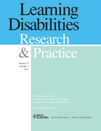
Learning Disabilities Research & Practice
Innovating practices for learning success.Learning Disabilities Research & Practice is a distinguished journal published by SAGE Publications Inc., dedicated to advancing research and practices surrounding learning disabilities. With a strong focus on the intersection of developmental psychology, education, and health, this U.S.-based journal plays a crucial role in disseminating innovative research findings and effective intervention strategies. As reflected in its impressive 2023 Quartile rankings, the journal stands in the Q1 category for both Education and Health (social sciences), indicating its significant impact within these fields. Furthermore, its placement in the Q2 category for Developmental and Educational Psychology demonstrates its relevance in psychological research. Learning Disabilities Research & Practice is indexed with a commendable Scopus ranking, making it an essential resource for researchers, professionals, and students committed to enhancing understanding and support for individuals with learning disabilities. While it operates under a subscription model, the journal's contributions to the field are indispensable, fostering a better understanding of learning challenges and promoting effective educational practices.
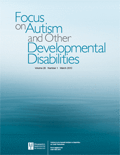
Focus on Autism and Other Developmental Disabilities
Connecting research and clinical practice in autism studies.Focus on Autism and Other Developmental Disabilities, published by SAGE Publications Inc, is an esteemed academic journal dedicated to advancing the understanding of autism and related developmental disorders. With a significant publication history dating back to 1986, this journal encompasses a wide range of interdisciplinary research, addressing key areas such as cognitive neuroscience, neurology, pediatrics, and mental health. The journal features a robust peer-review process, ensuring the dissemination of high-quality research critical for professionals in the field. While it is not an open access journal, Focus on Autism offers various access options for academic institutions and individuals, fostering an environment of shared knowledge and collaboration. With its recent categorization in the Q2 and Q3 quartiles across multiple fields within medicine and neuroscience, it stands out as a valuable resource for those looking to explore the complexities of developmental disabilities. Researchers, clinicians, and students alike will find this journal to be an essential platform for the latest findings, theoretical discussions, and clinical implications in the domain of autism and developmental disorders.

International Journal of Special Education
Connecting Ideas, Enhancing Learning JourneysInternational Journal of Special Education is a distinguished, open-access journal dedicated to advancing research and practices in the fields of special education and rehabilitation. Established in 1995 and published by Sped Sp Zoo in Canada, this journal has committed itself to fostering an inclusive academic environment where innovative ideas and evidence-based practices can flourish. As an open-access publication since 2020, it provides unfettered access to high-quality scholarly articles, enhancing global reach and engagement among researchers, educators, and professionals dedicated to special education. Despite its current Q4 status in both Education and Rehabilitation categories, the journal aims to elevate the discourse surrounding the educational needs of individuals with disabilities and the methodologies that support their learning journey. With an emphasis on robust research and interdisciplinary collaboration, the International Journal of Special Education aspires to become a vital resource for academics and practitioners alike, igniting a deeper understanding of special education practices and contributing to meaningful change in the education system.
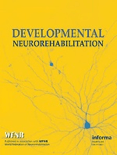
Developmental Neurorehabilitation
Bridging research and practice in pediatric rehabilitation.Developmental Neurorehabilitation is an esteemed journal published by Taylor & Francis Inc, dedicated to advancing the field of developmental neuroscience and rehabilitation. With an ISSN of 1751-8423 and an E-ISSN of 1751-8431, this journal serves as a vital resource for researchers, clinicians, and students interested in innovative therapeutic approaches and rehabilitation techniques for children and adolescents. Since its inception in 1997, Developmental Neurorehabilitation has focused on disseminating high-quality research, contributing to a deeper understanding of recovery processes in developmental disorders, and facilitating interdisciplinary dialogue among professionals. With its recognition in Q2 and Q3 quartiles across prominent categories such as Pediatrics and Rehabilitation, it stands out as a pivotal publication in its field, boasting Scopus rankings that reflect its significant impact—ranked #53 in Rehabilitation and #139 in Pediatrics, among others. While maintaining a commitment to quality research, the journal does not currently offer open access but remains accessible through institutional subscriptions, further enriching the academic landscape with critical insights into rehabilitation methodologies for developmental challenges and promoting better clinical practices to improve patient outcomes.
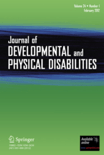
JOURNAL OF DEVELOPMENTAL AND PHYSICAL DISABILITIES
Bridging theory and practice for impactful change.JOURNAL OF DEVELOPMENTAL AND PHYSICAL DISABILITIES is a premier publication dedicated to the advancement of knowledge within the realms of developmental psychology, rehabilitation, and therapeutic practices. Published by Springer/Plenum Publishers, this journal serves as a critical platform for researchers, clinicians, and educators who are passionate about understanding and improving the lives of individuals with developmental and physical disabilities. With an impressive Timeline spanning from 1991 to 2024, it holds significant rankings in Category Quartiles, including Q3 in Developmental and Educational Psychology and Q2 in Physical Therapy, Sports Therapy, and Rehabilitation. The journal reaches a broad audience in the United States and beyond, providing insightful research articles that contribute to both theoretical and practical applications in the field. Although not currently an open-access platform, its strategic positioning within Scopus rankings underscores its importance, featuring a rank of 80/247 in Health Professions and 163/360 in Psychology. The journal is an essential resource for those committed to promoting evidence-based practices and enhancing the quality of life for people with disabilities.